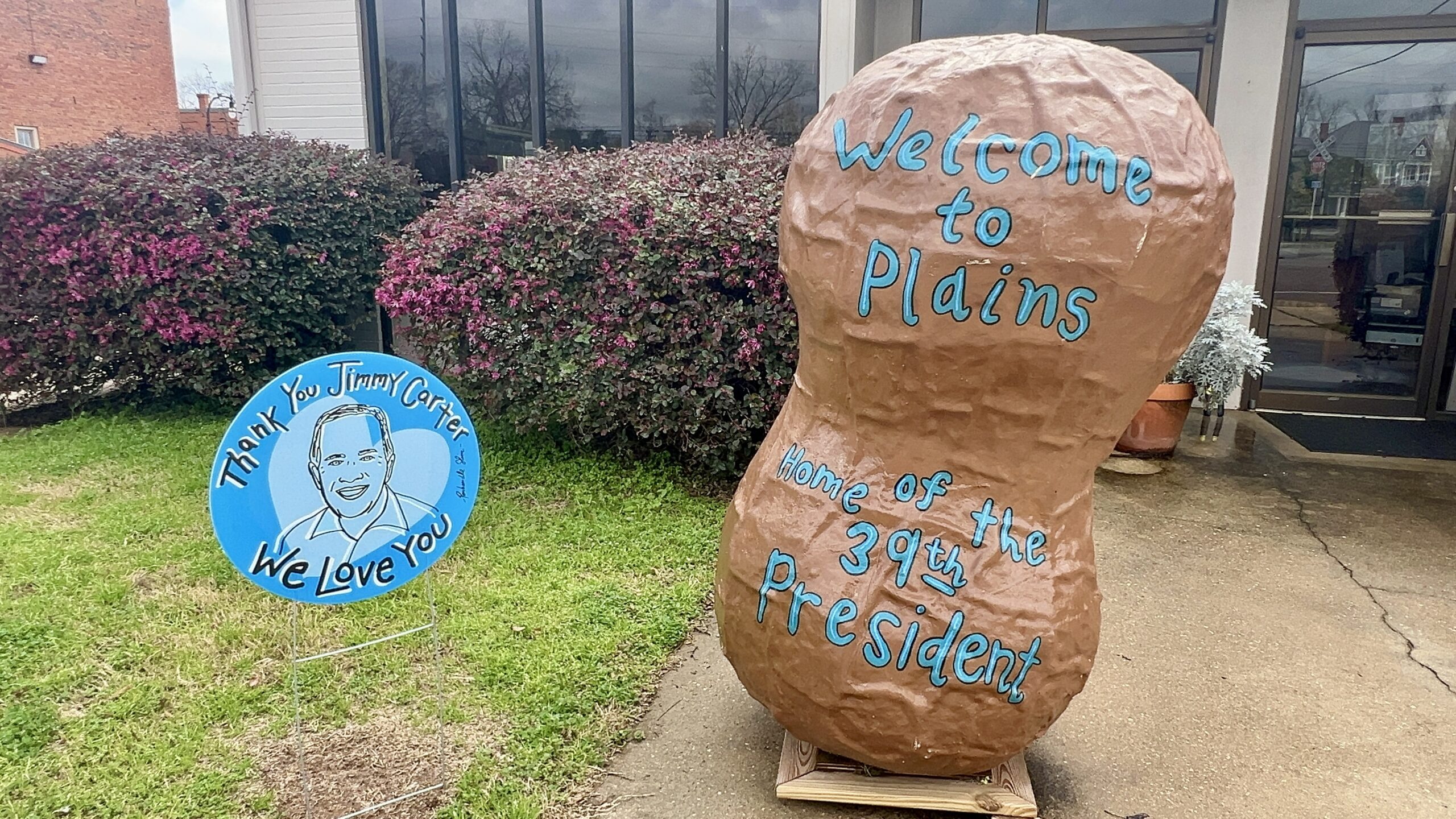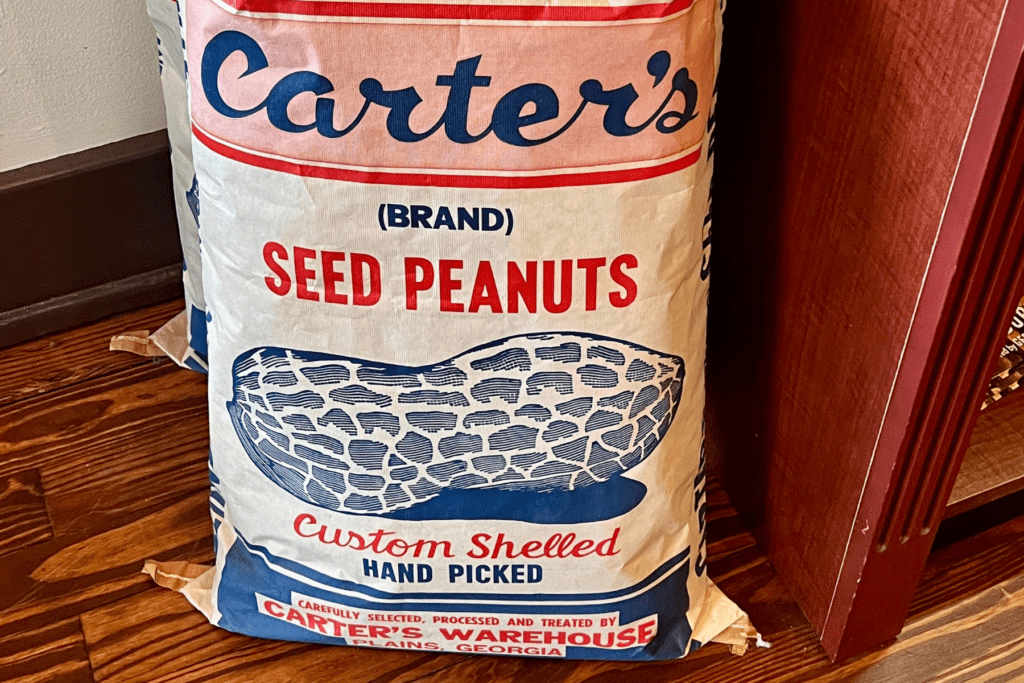
In the quiet rural expanse of southwestern Georgia lies a town that may seem unremarkable at first glance, yet holds profound historical significance for the nation: Plains, Georgia. This small town, with a population of fewer than a thousand, was the birthplace and lifelong home of one of America’s most beloved leaders, Jimmy Carter. While Carter’s presidency is well-remembered for its focus on human rights, diplomacy, and energy conservation, the origins of his character and values are deeply rooted in this humble community. Visiting Plains and strolling through its streets offers an intimate glimpse into the boyhood and early influences of the 39th President of the United States, making it a must-visit destination for history buffs and those seeking a deeper understanding of the man behind the office.
Disclosure: Some links on our site are affiliate links. If you purchase a linked item, we will make a commission, at no extra charge to you.
Former President Jimmy Carter
James Earl “Jimmy” Carter Jr., born on October 1, 1924, in Plains, Georgia, is a former U.S. President, humanitarian, and Nobel Peace Prize laureate. He grew up in rural Georgia during the Great Depression, a time that deeply influenced his values of hard work, self-reliance, and a sense of responsibility for others. The eldest of four children, Carter was raised on his family’s farm in Archery, a small rural community just outside Plains. From a young age, he helped tend to crops, work with livestock, and experience the simple yet challenging lifestyle that shaped his future views on community and service.
Jimmy Carter first made his mark through military service, attending the U.S. Naval Academy in Annapolis and serving as a naval officer for seven years. His military career was focused on submarines, but after his father’s death in 1953, Carter returned to Georgia to take over the family’s peanut farm, quickly proving his aptitude for business. His return to Plains also sparked his interest in local politics, leading to his involvement in community affairs and, eventually, a bid for political office.
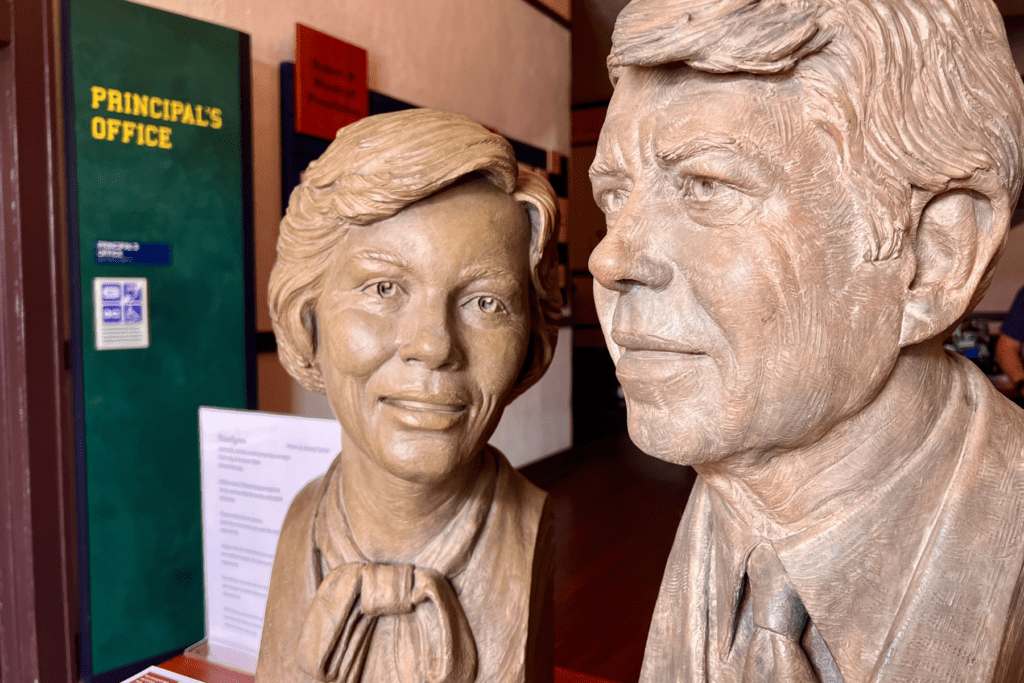
Carter’s political career began with the Georgia State Senate, where he served two terms before winning the governorship in 1970. As governor of Georgia, Carter gained national recognition for his progressive views, particularly his efforts to combat racial segregation and promote equality. His emphasis on integrity, transparency, and honesty in government earned him a reputation as a reformer, which set the stage for his 1976 presidential campaign.
As the 39th President of the United States, serving from 1977 to 1981, Carter prioritized human rights, environmental conservation, and energy reform. His foreign policy achievements included the Camp David Accords, which helped broker peace between Egypt and Israel, and his work to improve diplomatic relations with China. Despite these accomplishments, his presidency faced challenges which contributed to his defeat in the 1980 election.
However, Carter’s post-presidency years are widely regarded as his greatest legacy. In 1982, he founded the Carter Center, a non-profit organization dedicated to advancing human rights, promoting democracy, and fighting diseases like guinea worm and river blindness. Through the Carter Center, he played a pivotal role in conflict resolution and election monitoring across the globe. In 2002, he was awarded the Nobel Peace Prize for his decades of tireless humanitarian work.
Today, Jimmy Carter is seen not only as a former president but as a lifelong advocate for peace, human rights, and public service. His commitment to bettering the world, particularly through his work with the Carter Center and his hands-on involvement with Habitat for Humanity, has solidified his place as one of America’s most respected elder statesmen.
The Legacy of Plains, Georgia
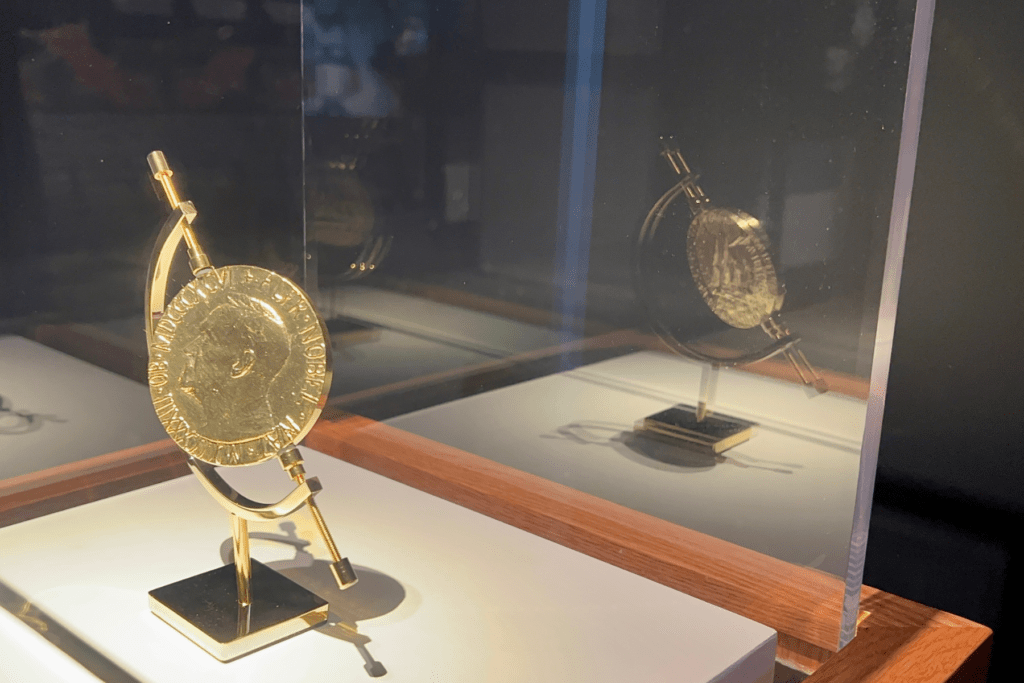
Before delving into the specifics of Jimmy Carter’s life in Plains, it’s worth appreciating the town. Plains is a quintessential Southern farming community. Established in the 1880s as a railroad town, Plains developed around agriculture, particularly peanuts, cotton, and other crops that thrive in the region’s warm climate. Although its population has always been small, the town’s significance far outweighs its size, thanks largely to the Carter family.
Plains maintains its charm with historic buildings, friendly locals, and a relaxed pace of life. The town’s preservation efforts reflect a deep respect for its history and the Carter legacy. Visitors often feel as though they’ve stepped back in time while walking down its streets.
Jimmy Carter’s Boyhood Home: A Glimpse into Rural Life
No visit to Plains is complete without a stop at the Jimmy Carter Boyhood Farm, just a short drive from the town’s center in the rural area where the future president spent his early years. Today, the farm is part of the Jimmy Carter National Historical Park, offering an immersive experience into the environment that shaped Carter’s values, work ethic, and perspective on life.
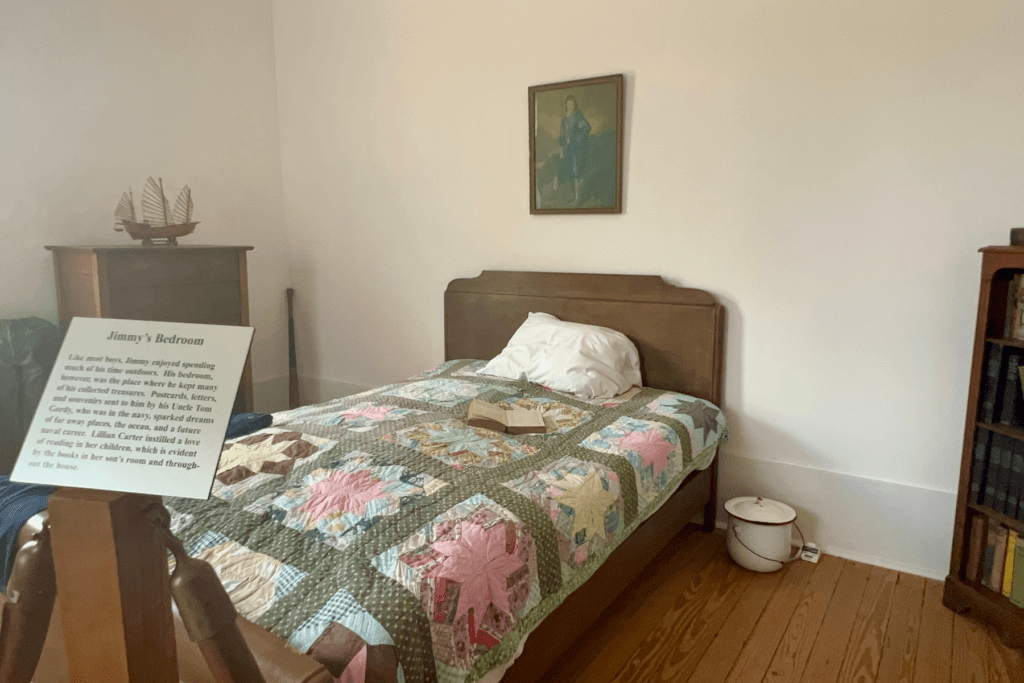
The farm is preserved much as it was in the 1920s and 1930s, when Carter was a boy. Visitors can explore the farmhouse, barns, and fields where young Jimmy helped his father with the daily tasks of running a farm. The farmhouse itself is modest but speaks volumes about the simplicity and self-sufficiency that defined the Carter family’s lifestyle. Furnished with period pieces, the house gives visitors a sense of what life was like in the rural South during the Great Depression.
One of the most fascinating aspects of the boyhood home is how the Carters lived off the land. The farm was not just a business but a way of life, with crops, livestock, and a large garden providing most of the family’s food. Jimmy Carter later reflected on these early experiences, crediting them with instilling a strong sense of responsibility, hard work, and respect for nature—values that carried through his presidency.
An unexpected feature of Jimmy Carter’s boyhood home is the clay tennis court. Built by Earl Carter, Jimmy’s father, the court provided young Jimmy and his siblings with a place to hone their tennis skills, which became one of Carter’s favorite pastimes.
Plains High School: Where President Carter Attended School
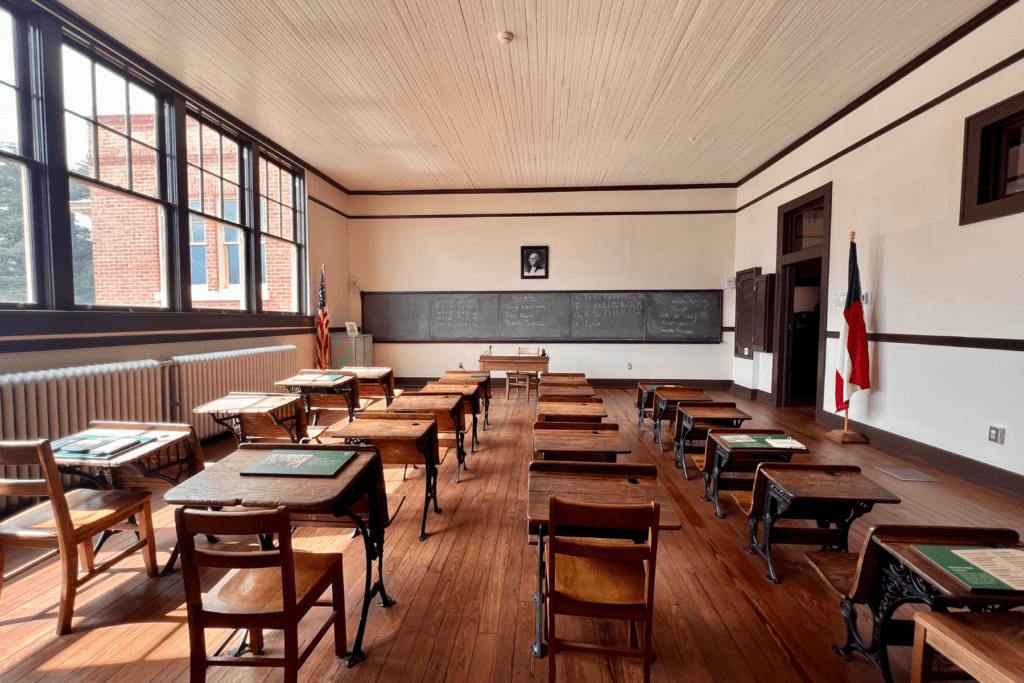
Next on the itinerary is Plains High School, which now serves as the main visitor center for the Jimmy Carter National Historical Park. This is where Carter attended school from 1930 until his graduation in 1941. The school building, originally constructed in 1921, has been meticulously restored and now serves as a museum that details Carter’s educational background and early life in Plains.
As you step inside Plains High School, you’re greeted by exhibits that chronicle Carter’s journey from a small-town student to a global leader. One of the most interesting aspects of the school is its role in shaping Carter’s intellect and curiosity about the world. Although the school was small—serving students from first through eleventh grades—Carter’s teachers left a lasting impact on him. His mother, Lillian Carter, also had a significant influence, encouraging her son to be kind, curious, and community-minded.
One of the classrooms has been restored to its original appearance, complete with desks and blackboards from Carter’s time. It’s easy to imagine a young Jimmy Carter sitting at one of these desks, already developing the diligence and integrity that would later define his presidency. The school also features a large collection of photographs, documents, and personal items that paint a vivid picture of Carter’s early years.
As a future naval officer, governor, and president, education was a crucial foundation for Jimmy Carter. His time at Plains High School instilled in him the importance of learning, critical thinking, and public service—values he emphasized throughout his life and political career.
Carter’s Campaign Headquarters: Birthplace of a Political Career
While Plains is often thought of as Carter’s hometown in a personal sense, it’s also the place where his political journey began. A visit to Carter’s campaign headquarters offers a unique glimpse into the early stages of his political career. This modest building served as the headquarters for Carter’s 1976 presidential campaign and remains preserved today as part of the town’s historical offerings.
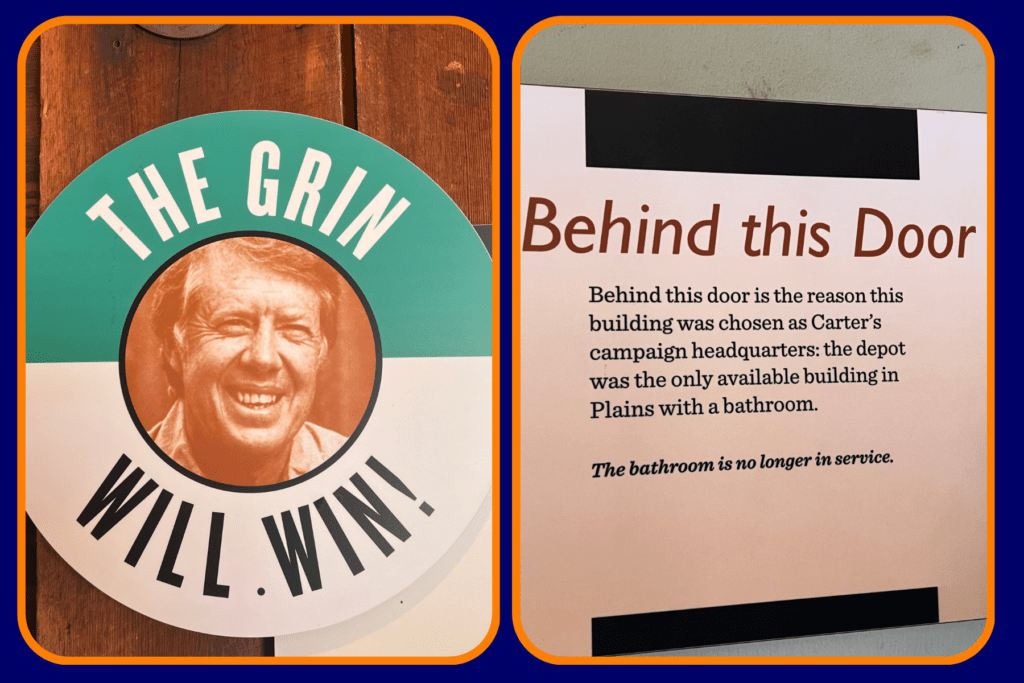
Walking through the doors of this unassuming brick building, it’s hard to believe that this was once the nerve center of a campaign that took a former Georgia governor all the way to the White House. The simplicity of the office is a testament to Carter’s grassroots approach to politics. His campaign focused on connecting directly with voters, traveling across the country to shake hands and meet people face-to-face. This personal touch helped Carter build a reputation as a man of the people, someone who understood the struggles of ordinary Americans.
Inside the former campaign office, you’ll find memorabilia from the 1976 election, including campaign posters, buttons, and photographs. There’s also a fascinating collection of correspondence between Carter and his supporters, providing insight into how he ran his campaign. Carter’s emphasis on honesty, integrity, and transparency resonated with voters, helping him win the Democratic nomination and, eventually, the presidency.
Visitors can also learn about the Carter family’s peanut business, which was a crucial part of their life in Plains. The peanut warehouse not only served as campaign headquarters but was also the hub of the family’s agricultural enterprise. Today, the building stands as a symbol of Carter’s connection to his rural roots and his rise from a small-town background to the highest office in the land.
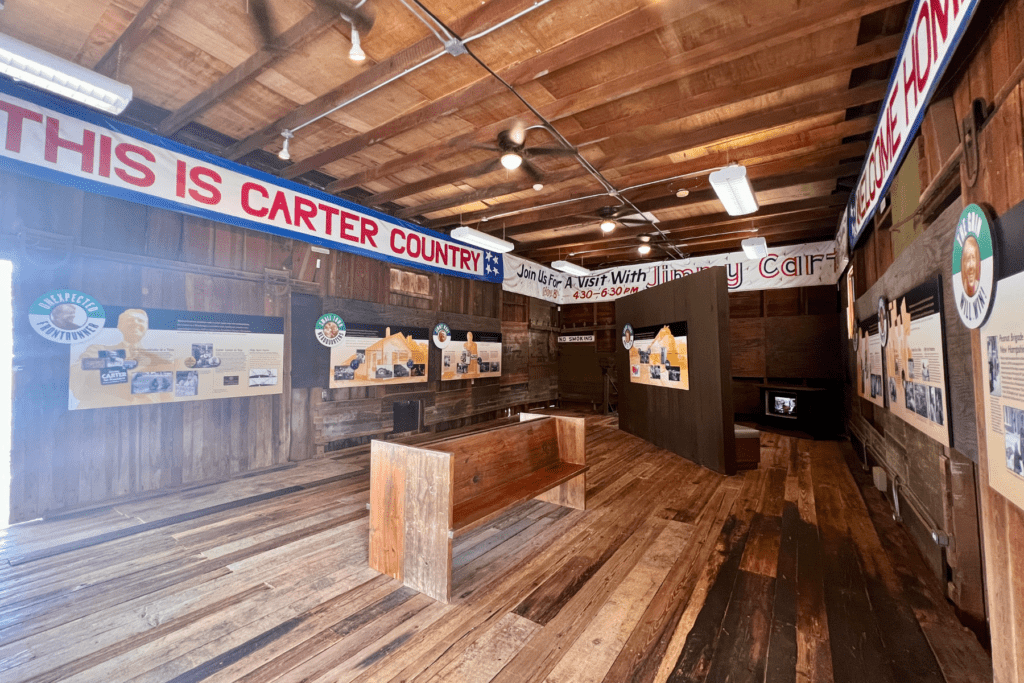
Billy Carter: Life in Plains and His Famous Service Station
No discussion of Plains, Georgia, would be complete without mentioning Jimmy Carter’s colorful younger brother, Billy Carter. While Jimmy’s life was marked by public service and political ambition, Billy carved out his own unique identity in the small town of Plains, where he became somewhat of a local celebrity, as well as a national figure, during his brother’s presidency. Known for his larger-than-life personality and sense of humor, Billy’s antics and down-to-earth demeanor made him a beloved character in Plains and a media darling across the country.
Billy ran a service station in Plains, which quickly became a gathering place for locals and visitors alike. Located along the main road through town, Billy Carter’s Service Station was far more than a place to fill up your tank—it was a hub of social activity. Billy himself was often found sitting out front, chatting with customers, telling stories, and sharing his thoughts on politics, often with a beer in hand. His straightforward, unpolished style contrasted sharply with Jimmy’s more reserved demeanor, but it endeared him to many people, especially those who saw him as a representation of Southern hospitality and charm.
During the late 1970s, when Jimmy Carter was serving as President, Billy gained even more attention, sometimes for his outspoken nature and sometimes for controversial behavior. He famously endorsed a beer brand, leading to the creation of Billy Beer, which became a novelty and collector’s item. Despite some of the controversies he faced—including a highly publicized visit to Libya—Billy remained a fixture in Plains, known for his warmth, wit, and unapologetic individuality.
The service station itself remains a point of interest for visitors today. It has been preserved as part of Plains’ historical sites, offering a glimpse into the town’s vibrant past and the quirky character of its most famous residents.
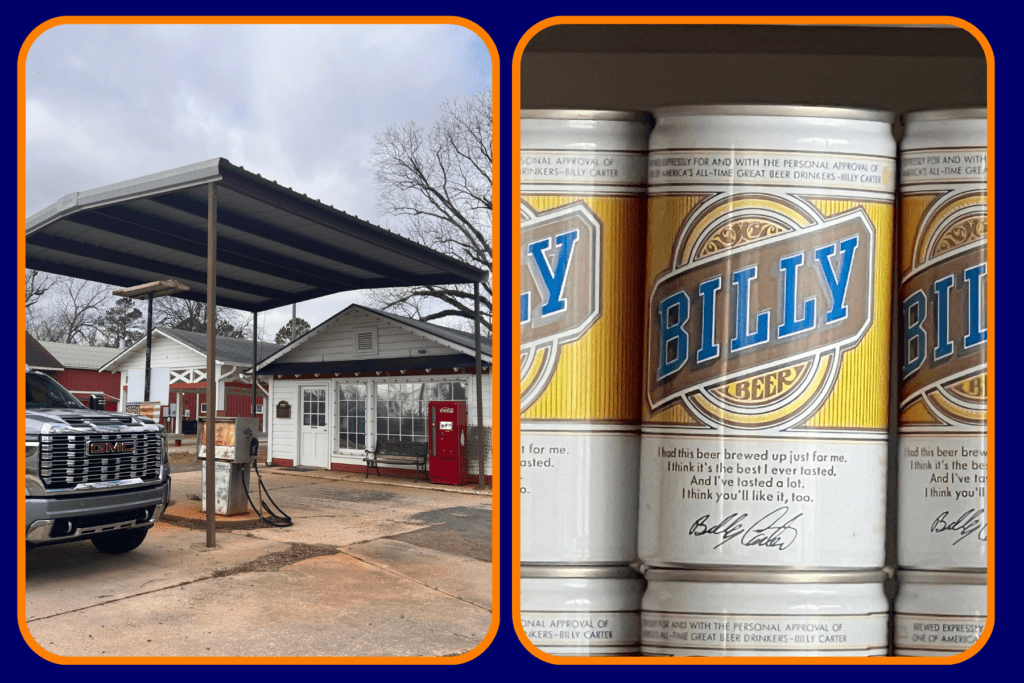
Connecting with the Roots of a Leader
Visiting Plains, Georgia, is not just about exploring the life of a former president—it’s about experiencing the values and principles that shaped one of the most remarkable figures in American history. Jimmy Carter’s story is one of humility, perseverance, and dedication to public service, and nowhere is that story more vividly told than in the town where it all began.
As you walk through the fields of his boyhood farm, sit in the classroom where he learned about the world, and stand in the office where his political journey began, you’ll gain a deeper appreciation for the man behind the presidency. Plains may be small, but its impact on American history is immense. A visit here offers a rare opportunity to connect with the roots of a leader who continues to inspire millions.


